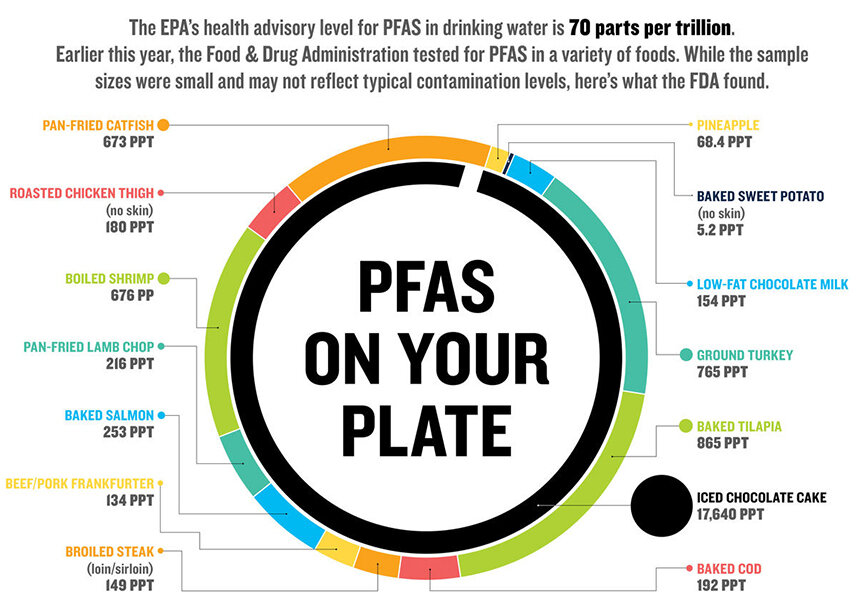Rhode Island Must Address ‘Forever Chemicals’
June 7, 2022

They are in the coating of your nonstick frying pan. The wrapper of your favorite burger. The stain-resistant upholstery of your couch, and even the water coming from your tap.
They are PFAS — per- and polyfluoroalkyl substances — a huge group of toxic chemicals that are used in thousands of consumer products, and they are now also in our water and the blood of nearly every American.
The General Assembly is considering several bills to limit Rhode Islanders’ exposure to these “forever chemicals,” so named because they stay in the environment rather than breaking down. Two bills focus on testing for PFAS in drinking water (H7233) and soil (H7234) and cleaning it up. Two others focus on limiting contamination of our water and landfill by banning PFAS from products such as food wrappers (H7438A), clothing, carpeting, furniture, and firefighting foam (H7436). Another creates a task force to develop strategies and secure funding to help fire departments replace PFAS-laden turnout gear with PFAS-free gear (H8133).
Every day, we learn more about the pervasiveness of PFAS in our environment and ourselves, and about its dangers. The Agency for Toxic Substances and Disease Registry notes studies have associated PFAS with increased cholesterol, decreased vaccine efficacy, changes in liver enzymes, low birth weight, and increased incidence of testicular and kidney cancer.
Virtually every American has PFAS in their blood, absorbing it through the water they drink, their clothes, their nonstick pans, and fast-food wrappers. The extent of contamination is not fully known, as this is a large family of chemicals — several thousand — that have not been routinely monitored.
What we know for sure is that we need legislation to control the introduction of these chemicals into our water and soil by using products that don’t contain them. And we must set a contaminant limit — we propose 20 parts per trillion — so water suppliers and well owners can test their water against it, and immediately remediate if necessary.
We must also begin the process of replacing firefighters’ gear and firefighting foam with PFAS-free alternatives. Over the past several years, cancer has replaced heart attacks and line-of-duty incidents as the leading cause of firefighter deaths. Scientists point to the shedding of PFAS, both into the air when exposed to the heat of a fire and into the skin through wearing PFAS-laden gear, as a likely reason.
The good news is that private-sector companies are now waking up to the dangers of PFAS. A recent study by Consumer Reports found PFAS in packaging, plates, bowls, and utensils of most major fast-food chains. Several of these companies, from McDonald’s to Burger King to Chipotle, say they will move to PFAS-free wrappers.
There are now alternatives to PFAS-laden firefighting foam. Work is underway on alternatives for turnout gear. And when the U.S. House of Representatives passed the Build Back Better bill, it allocated $95 million to fund the replacement of contaminated gear. Although the bill did not move forward, this underscores the significance of the problem.
The federal government is, at long last, directing its attention to these toxins. The Environmental Protection Agency issued a PFAS Strategic Roadmap in late 2021, and the recently passed infrastructure bill includes $10 billion for addressing PFAS in drinking water, some of which will come to Rhode Island.
For now, it is essential that we pass this legislation in Rhode Island, as many of our neighbors have done.
Rep. June Speakman (D-District 68, Warren, Bristol) and Rep. Terri Cortvriend (D-District 72, Portsmouth, Middletown) are the sponsors of several House bills addressing PFAS.
Categories
Join the Discussion
View CommentsYour support keeps our reporters on the environmental beat.
Reader support is at the core of our nonprofit news model. Together, we can keep the environment in the headlines.
We use cookies to improve your experience and deliver personalized content. View Cookie Settings



